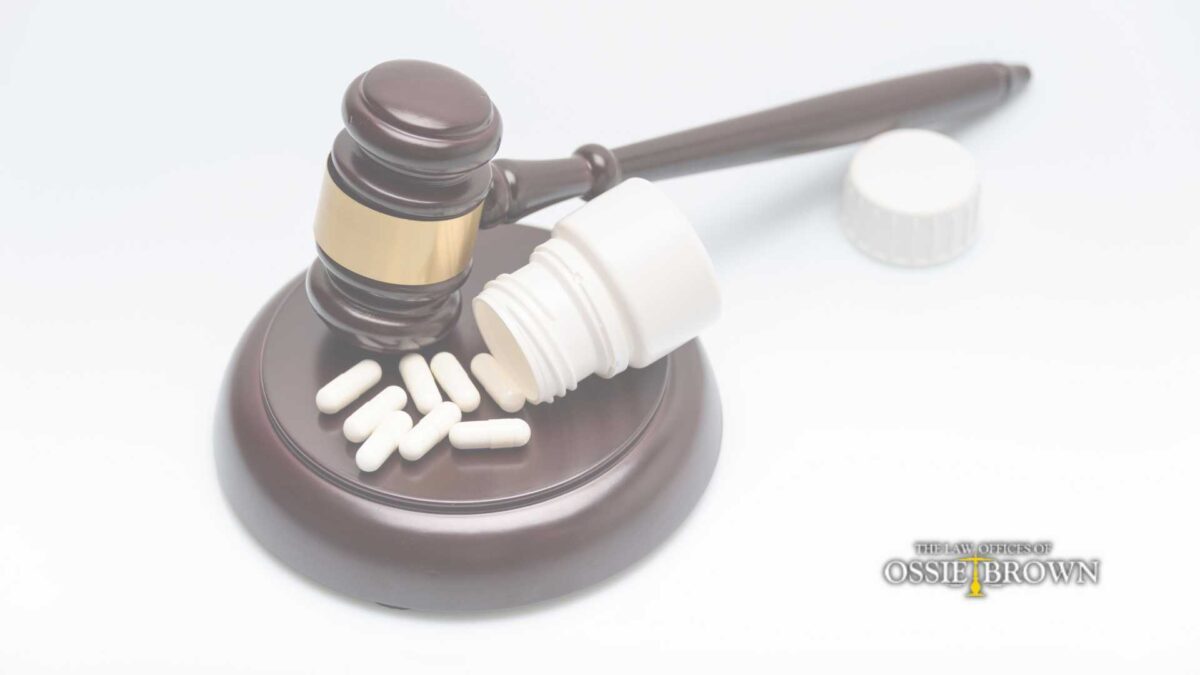Under Louisiana law, penalties for the drug possession, distribution, or trafficking of illegal substances are harsh, with escalating consequences based on the type of drug and the aggregate weight found. Schedule 1 and Schedule 2 drugs in Louisiana are typically categorized based on their potential for a potential substance abuse disorder and are considered the most dangerous substances. While penalties for controlled dangerous substances typically depend on aggregate weight and number of offenses.
If you’re facing trafficking, distribution, or drug possession charges, call 225-343-1111 for a free consultation with a Baton Rouge criminal defense attorney at the Law Offices of Ossie Brown.
Schedule 1 Drugs Louisiana
Schedule I substances in Louisiana are considered the most dangerous due to their high potential for a substance abuse disorder and no accepted medical use. These controlled dangerous substances include:
- Heroin
- Ecstasy (MDMA)
- LSD
- Hallucinogens like gamma-hydroxybutyric acid (GHB).
A conviction of drug possession charges for this controlled dangerous substance carries severe penalties, including imprisonment and hard labor.
Schedule 2 Drugs Louisiana
Schedule II drugs have accepted medical use but also have a high potential for abuse. Schedule 2 drugs in Louisiana include:
- Cocaine
- Methamphetamine
- Adderall
- Fentanyl
Any controlled substance analogue classified under Schedule 2 in Louisiana must meet stringent regulatory requirements. Unauthorized drug possession charges of Schedule 2 controlled substances carry harsh penalties.
Schedule 3 Drugs Louisiana
Schedule III drugs in Louisiana have a moderate to low potential for physical and psychological dependence. A few Schedule 3 controlled dangerous substance examples under Louisiana revised statutes include:
- Anabolic steroids
- Certain barbiturates
- Codeine-based medications with less than 90 milligrams per dosage unit
- Ketamine
While they have accepted medical use, drug possession of such substances is illegal under Louisiana law.
Schedule 4 Drugs Louisiana
Schedule IV drugs have a moderate to low potential for forming a substance abuse disorder and have accepted medical use. A few Schedule 4 controlled dangerous substance examples under Louisiana revised statutes include:
- Ambien
- Tramadol
- Valium
- Soma
- Xanax
A person knowingly possessing a controlled dangerous substance without a valid prescription can be charged with drug possession under Louisiana law.
Schedule 5 Drugs Louisiana
Schedule V substances have the lowest potential for substance abuse disorders. While penalties are less severe compared to other drug charges, illegal drug possession can still result in up to five years in jail and having to pay a fine of up to $5,000 (five thousand dollars).
Penalties for Controlled Dangerous Substances in Louisiana
Louisiana law imposes strict penalties for drug possession, distribution, and trafficking, especially when aggravating factors are involved or for repeat offenses. Under Louisiana’s three-strike rule, a third offense can lead to a minimum of twelve years in jail, even for non-violent crimes like drug possession.
Additionally, for Schedule I or II drugs in Louisiana, drug possession of an aggregate weight of twenty-eight grams or more can lead to one to no more than twenty years in prison with or without hard labor and require the person to pay a fine of up to fifty thousand dollars.
Penalties for Schedule I Drugs
Schedule I substances are considered the most dangerous due to their high potential for abuse and no accepted medical use. Examples include marijuana, heroin, LSD, ecstasy (MDMA), and certain hallucinogens.
According to Louisiana Revised Statutes, for general Schedule I drugs (excluding marijuana, heroin, fentanyl, or carfentanil), penalties vary. Those convicted may face up to ten years in prison with or without hard labor and to pay a fine up to $5,000 (five thousand dollars).
Marijuana Charges
In Louisiana, marijuana is classified as a controlled dangerous substance, and while federal law still considers drug possession for marijuana illegal, Louisiana has specific penalties for drug possession based on the aggregate weight and number of offenses.
- First offense (aggregate weight of 14 grams or less): up to 15 days in jail and a $300 fine.
- First offense (aggregate weight of over 14 grams but less than 2.5 pounds): up to 6 months in jail and a $500 fine.
- Second offense: Up to 6 months in jail and a $1,000 fine (one thousand dollars) .
- Third offense: A felony charge with up to 2 years in jail and a $2,500 fine (two thousand, five hundred dollars).
- Fourth offense: Up to 8 years in jail and fines up to $5,000 (five thousand dollars).
Additional penalties may apply for impaired driving. A Baton Rouge marijuana DUI lawyer can help ensure your rights are protected in such cases.
Heroin Charges
Heroin is one of the most dangerous controlled substances due to its high potential for addiction and overdose. Penalties include:
- Drug possession of less than two grams: up to four years of jail time and a $5,000 fine
- Two grams to 28 grams: no more than ten years of jail time with hard labor and a fine of up to $50,000
- 28 grams to 200 grams: up to fifty years of jail time with hard labor and a fine of up to $100,000
- 200 grams to 400 grams: at least twenty-five years but no more than forty years of jail time with hard labor and a fine of up to $350,000
- More than 400 grams: at least thirty years but no more than sixty years of jail time with hard labor and a fine of up to $600,000
If the offender unlawfully distributes heroin or a mixture of such substance containing a detectable amount of heroin, and this is a direct cause of serious bodily injury to someone who consumed it, this is considered a violent crime in Louisiana. If convicted, the offender will face no less than five years but no more than forty years imprisonment with hard labor. Offenders may also be required to pay a fine of no more than $50,000 (fifty thousand dollars).
If you’re facing heroin-related charges, contact a Baton Rouge heroin lawyer for legal representation.
Ecstasy Charges
Drug possession of ecstasy (MDMA) carries severe penalties under Louisiana law. Even small amounts can result in up to ten years in prison with or without hard labor and a fine of up to $5,000 (five thousand dollars).
Penalties for Schedule II Drugs
Drug possession of Schedule 2 drugs in Louisiana, such as cocaine, methamphetamine, Adderall, or fentanyl, is treated as a serious offense. Schedule II substances are those that have a high potential for physical and psychological dependence but also have medical applications. Possessing such substance classified under Schedule II without a prescription can result in severe penalties.
Cocaine Charges
Cocaine is classified as a Schedule II controlled dangerous substance. In Louisiana, the following drug possession, distribution, and trafficking penalties include:
- Less than 28 grams (twenty-eight grams): up to 5 years of jail time with or without hard labor and a $5,000 fine
- Over 28 grams (twenty-eight grams) but less than 200 grams (two hundred grams): 10 to 60 years of jail time with or without hard labor and up to $150,000 in fines
- 200 grams (two hundred grams) to 400 grams (four hundred grams): felony charges and jail time of up to 60 years and a fine of up to $350,000
- Over 400 grams (four hundred grams): up to sixty years in jail and up to $600,000 in fines
Cocaine charges can have serious consequences in Louisiana. If you’ve been charged with drug possession, distribution, or trafficking, contact a Baton Rouge cocaine lawyer for a free consultation.
Methamphetamine Charges
In Louisiana, drug possession of methamphetamine is a serious offense. Methamphetamine is classified as a Schedule II substance. The general penalties for such Schedule 2 drugs in Louisiana are based on aggregate weight and include:
- Less than 28 grams (twenty-eight grams): a maximum sentence of ten years and a fine up to $5,000
- 28 grams (twenty-eight grams) to 200 grams (two hundred grams): at least ten years but no more than thirty years and fines up to $50,000
- 200 grams (two hundred grams) to 400 grams (fourth hundred grams): a maximum sentence of sixty years and fines up to $500,000
These penalties reflect Louisiana’s strict stance on controlled substances, particularly methamphetamine. Enhanced penalties may apply if additional factors, such as distribution or charges under Louisiana’s child endangerment law, are involved. To learn more, contact our Baton Rouge child endangerment lawyers.
Adderall Charges
Adderall, a legal prescription drug for ADHD, is a Schedule II drug in Louisiana. Drug possession without a prescription is illegal. Penalties are based on the aggregate weight and can include imprisonment and fines.
- Less than 28 grams (twenty-eight grams): maximum sentence of ten years in prison and a fine of up to $5,000
- 28 grams (twenty-eight grams) to 200 grams (two hundred grams): a prison sentence of at least ten years but no more than thirty years, with fines up to $50,000
- 200 grams (two hundred grams) to 400 grams (four hundred grams): a maximum prison sentence of sixty years, with fines up to $500,000.
Fentanyl Charges
In Louisiana, all fentanyl charges are felony offenses. Penalties are based on aggregate weight and include:
- Less than 28 grams (twenty-eight grams): five to no more than forty years in jail with or without hard labor and a fine of up to $50,000
- 28 grams (twenty-eight grams) or 250 grams (two hundred fifty grams): a minimum mandatory sentence of seven years to forty years in jail and a fine of up to $50,000
- 250 grams (two hundred fifty grams) or more: thirty-five years to life in prison and a fine of up to $50,000
In the past, fentanyl charges started at less than two grams. However, under Louisiana Revised Statutes, the initial offense is twenty-eight grams or less.
For distribution of fentanyl that results in the direct cause of serious bodily injury or death, enhanced penalties apply under Millie’s Law in Louisiana. Under Millie’s law, offenders can face a prison sentence of 5 to 45 years without the possibility of probation or parole.
In Louisiana, defendants with fentanyl or carfentanil addiction may be eligible for alternative sentencing, such as probation or approved treatment programs within the local jurisdiction, depending on the judicial determination. During such contradictory hearing, the court evaluates such report from addiction experts to assess the defendant’s needs and ability to complete rehabilitation. If the court determines that this would lead to substantial financial hardship or hinder recovery efforts, the judge may order that the defendant complete a treatment program if they qualify as one of the criminal justice participants.
A Baton Rouge fentanyl lawyer can help defend your fentanyl charges and protect your rights.
Penalties for Schedule III Drugs
In Louisiana, drug possession of a Schedule III drug such as anabolic steroids or codeine-based medications is treated as a serious offense, though less severe than Schedule I or Schedule II charges.
Schedule III substances have a moderate to low potential for abuse. Possessing such substances classified under Schedule III without a valid prescription from a professional practice can result in you spending up to five years in prison and having to pay a fine of up to ten thousand dollars ($10,000). Penalties may increase for larger quantities, intent to distribute, or prior drug convictions.
Penalties for Schedule IV Drugs
In Louisiana, penalties for Schedule 4 drugs involve substances with a lower risk of abuse but still pose the danger of physical and psychological dependence. Possession of a detectable amount of these illegal drugs, such as Xanax or Valium, can lead to significant consequences. A first offense can result in no more than ten years in prison, and offenders may also have to pay a fine of up to five thousand dollars ($5,000). Larger amounts or repeat offenses often result in harsher penalties, reflecting the state’s strict approach to drug crimes.
Penalties for Schedule V Drugs
In Louisiana, possession of a substance classified as Schedule 5, while having a lower potential for abuse, still carries penalties. A first offense of a detectable amount of Schedule 5 drugs can result in up to 5 years in prison and you to pay a fine of up to five thousand dollars ($5,000). Repeated offenses or larger amounts can lead to harsher penalties, especially if the case involves distribution or trafficking.
Drug Possession Charges in Louisiana
Possession charges depend on the type and detectable amount of dangerous drug. Penalties can range from probation pursuant to certain conditions to lengthy imprisonment and fines. Participation in a drug treatment program might be mandated.
If you’ve been charged with drug possession, contact our Baton Rouge drug possession lawyer to see how we can help.
Drug Distribution Charges in Louisiana
In Louisiana, drug distribution charges carry severe penalties, depending on the type and detectable amount. Convictions can result in long prison sentences, substantial fines, and a permanent criminal record. A Baton Rouge drug distribution lawyer can help navigate the complex legal system, challenge evidence, and build a strong defense to minimize or dismiss charges.
Drug Trafficking Charges in Louisiana
Drug trafficking involves the transport and distribution of large quantities of controlled substances. Penalties include long-term to life imprisonment and significant fines. If you’ve been charged, contact our Baton Rouge drug trafficking attorney to see how our law firm can help.
Creation or Operation of a Clandestine Laboratory in Louisiana
Operating a clandestine lab to manufacture illegal drugs is a serious offense. If convicted, you’re facing five to fifteen years with hard labor and may pay a fine of up to twenty-five thousand dollars. Additional penalties apply if a minor child is present or if the operation is located near schools, churches, or other protected areas.
Commonly Asked Louisiana Controlled Substance Questions
Is Adderall a Controlled Substance in Louisiana?
Yes, Adderall is a Schedule II drug in Louisiana.
Is Tramadol a Controlled Substance in Louisiana?
Yes, in Louisiana, Tramadol is classified as a Schedule IV drug.
Is Phentermine a Controlled Substance in Louisiana?
Yes, in Louisiana, Phentermine is a Schedule IV drug.
Is Ambien a Controlled Substance in Louisiana?
Yes, in Louisiana, Ambien is classified as a Schedule IV drug.
Defense Strategies for Controlled Dangerous Substance Charges in Baton Rouge
When facing drug charges in Louisiana that involve controlled dangerous substances, there are several defense strategies available. One possible defense is entrapment. What is entrapment in Louisiana? This occurs when law enforcement induces a person to commit a crime they otherwise wouldn’t have.
Additionally, a pretrial diversion program in Louisiana might be an option, where the defendant could avoid conviction by participating in a drug treatment program. During a contradictory hearing, the defense may present evidence of a substance abuse disorder supported by a substance abuse evaluation. If the defendant is able to successfully complete a diversion or treatment program, charges could be dismissed or reduced.
Contact the Law Offices of Ossie Brown today at 225-343-1111 to schedule a consultation.




